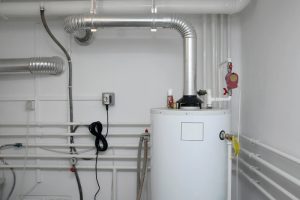
Do you think that the boiler you use to heat your home should leak? Your answer to that is almost certainly no. Leaks of any kind in water-carrying systems in a house are bad news. Your boiler isn’t part of the standard plumbing, but part of the heating system. However, it relies on the circulation of water to provide warmth to your house, traveling from the tank through pipes to the various terminal points (radiators, baseboard heaters, in-floor piping). If you notice water leaking from the boiler system (with one exception) there’s something wrong that will require heater repair in Delaware.
Need to know more about what’s going on? We’ll get into that below.
Why Is My Boiler Leaking?
You’ve noticed water pooling around the boiler, and you’re concerned. That’s a good instinct to have, but it’s important not to panic since you can get help.
The most common cause of water leaking from a boiler is because of high pressure inside the system, some of which is released through a pressure release valve. If the water is coming from the pressure release valve on that tank, that’s normal: the boiler isn’t leaking, only releasing pressure. However, if it’s more water than a few drips from the valve, the boiler’s pressure may be extremely high, and you’ll need professionals to “bleed” the boiler and lower it.
The other two common causes of leaks are loose connections and cracks/corrosion from age. Loose connections are at the joints, which can sometimes spring leaks due to expanding and contracting, or because of poor soldering from an amateur repair. Cracks and corrosion are often signs the boiler is too old to keep using and it’s best to have a new boiler installed. Corrosion on the tank isn’t something a boiler can recover from, and if you see it on the tank, it has likely set in elsewhere in the system.
Repair or Replace a Leaking Boiler?
That depends on the cause. We already mentioned above that a boiler that’s cracked or corroding is probably best replaced. At this point, the boiler is probably past its manufacturer’s estimated service life and will begin to lose heating capacity along with its other problems.
If the water leaking isn’t from the pressure relief valve, then it’s important that you call for us for repairs as soon as possible. Don’t use the boiler while you’re waiting for our technicians to arrive, since you may cause the leak to increase or even create a safety hazard. Shut off the power to the boiler completely until we arrive to help.
We don’t recommend you make any attempt to repair the boiler on your own, even if it seems like it might be something you can “patch.” Boilers are more complex than you probably realize, and if you have a gas boiler, it can be extremely hazardous to attempt an amateur repair. Our technicians can help determine if the boiler can be repaired (such as replacing worn joints or lowering water pressure) or if it’s too damaged or old for repairs to be worth it.
At Atlantic Refrigeration & Air Conditioning, Inc., “We Take Pride in Your Comfort!” Schedule boiler repairs with our team.
